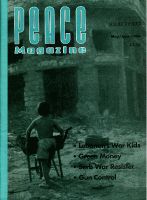
Peace Magazine May-Jun 1994, page 15. Some rights reserved.
Search for other articles by Anatol Rapoport here
Search for other articles by Metta Spencer here
Interview
Metta Spencer: Tell us about the referendum to abolish the army.
Ruth Meyer: In 1989 a little more than 35% of the voters supported it. Switzerland has the only militia army in the world. Males are conscripted, take a seventeen - week training, and then remain soldiers. They have two or three weeks further training every year or two. As a neutral country our army is purely defensive. Women enter the Swiss army only on a voluntary basis.
The army used to play an important integrative role in society. Many people learned about their country while in the military because they had to move to areas of Switzerland where they never would go otherwise. However, since the late 1970s, the army has lost a lot of support as an integrating symbol.
Anatol Rapoport: What happens in Switzerland to conscientious objectors?
Meyer: Now they can do alternative service. Until 1991 they went to jail.
Rapoport: For how long?
Meyer: A person with religious or ethical arguments would be jailed between three and six months. People with political arguments went to jail for one year. Now we are introducing alternative service. I think modern values are changing; we see the same trends in all countries, away from authoritarianism, obedience, and so on, and toward tolerance, more humanitarian values, and peace as a moral value. Still, in the data of 1993, the majority of people say we need an army. Switzerland is years behind other European countries, and one explanation is that Switzerland wasn't constrained after World War II to rethink the structural basis of society.
Spencer: But it can't be just conservatism, because the Swiss use the referendum so much. Direct democracy is not at all a conservative idea, but a very progressive idea, wouldn't you agree?
Meyer: It was a progressive idea in building up Switzerland in the second half of the 19th century. But I am sceptical about direct democracy on the level of the whole society with a highly complex question. There, it makes the population very susceptible to populist manipulation.
Spencer: Do you know of any decisions made by direct democracy in Switzerland that have been bad decisions?
Meyer: I would say the popular vote against the participation of Switzerland in the United Nations and the EVR were bad decisions. The EVR is the new economic treaty between the old EFTA (European Free Trade Association) statesandthe European Community. Switzerland voted against joining. You can't say that you are a modern society and not take some responsibility in a bigger context. Each side tried to manipulate the population in that vote -- especially the traditional right wing.
Rapoport: What do they fear losing by joining the United Nations?
Meyer: They fear losing neutrality, their special status in the world. I'm not sure that there are material interests at stake. Take this EVR. Switzerland's economy is highly interconnected with Europe, and the vote against EVR will put Switzerland into real economic difficulties.
Spencer: The rest of the world seems satisfied for Switzerland to stay the way it is, as a neutral place, because it provides services -- banking, Red Cross, mediation, and so on. It can do things because of its neutral role that it wouldn't be able to do otherwise.
Meyer: That's the view of right - wing conservatives.

Peace Magazine May-Jun 1994, page 15. Some rights reserved.
Search for other articles by Anatol Rapoport here
Search for other articles by Metta Spencer here